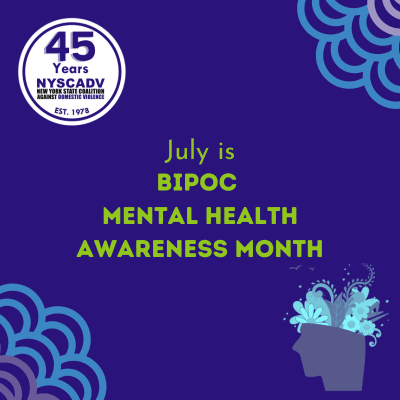
July is BIPOC (Black, Indigenous, and People of Color) Mental Health Awareness Month, a time to recognize the unique challenges and experiences faced by BIPOC individuals regarding mental health. As we observe this month, it is important to highlight the intersections of domestic violence and BIPOC mental health.
Domestic violence affects people of all races and ethnicities, but BIPOC individuals are disproportionately affected. They are more likely to experience domestic violence and less likely to receive the support and resources they need to heal and recover. This can significantly impact their mental health, leading to anxiety, depression, PTSD, and other mental health conditions.
One of the reasons for this disparity is the systemic racism and discrimination that BIPOC individuals face. This can make it difficult for them to access resources and support, leading to feelings of isolation and shame. Additionally, cultural factors can affect how BIPOC individuals experience and respond to domestic violence. For example, some cultures may view seeking help as a sign of weakness or a betrayal of family, which can prevent individuals from seeking the support they need.
Mental health professionals must understand these unique challenges and provide culturally sensitive and trauma-informed care to BIPOC individuals who have experienced domestic violence. This includes acknowledging the impact of systemic racism and discrimination, providing resources and support that are culturally relevant and appropriate, and creating a safe and supportive environment that fosters healing and recovery.
As we observe BIPOC Mental Health Awareness Month, let us remember the intersections of domestic violence and BIPOC mental health and work towards creating a world where all individuals, regardless of race or ethnicity, can access the support and resources they need to heal and thrive.
Here are some resources for support in New York State and the US related to the intersection of domestic violence and BIPOC mental health:
- #BIPOCMentalHealth campaign, Mental Health America - Help raise awareness this May by using their social media toolkit.
- NYSCADV Self-Care Toolkit: Recognizing the importance self-care plays into an individual's mental health, NYSCADV has compiled a list of resources, for advocates and organizations, on topics including self-care, well-being, and resilience. Included are webinars, toolkits, and additional resources to help advocates take care of themselves and to support the work that they are doing. Click here to access the self-care toolkit.
- The National Resource Center on Domestic Violence: This organization provides resources and technical assistance to organizations and individuals working to end domestic violence. They also have a page specifically addressing the unique needs of BIPOC survivors of domestic violence.
- In Our Own Voices: A New York State-based nonprofit whose mission is to ensure the physical, mental, spiritual, political, cultural and economic survival and growth of the Lesbian, Gay, Bisexual and Transgender people of color communities.
- Restore NY/Black Women's Blueprint: Founded by survivors for survivors committed to healing and transformation. Their mission is to provide services and spaces for healing, reconciliation, and human connection with the natural world. Working with the land, they bring people together to design and practice strategies for healing, health, and reparative economics.
- NYC Well: This is a 24/7 confidential helpline for all mental health and substance misuse services in New York City. They offer phone, text, and chat support.


